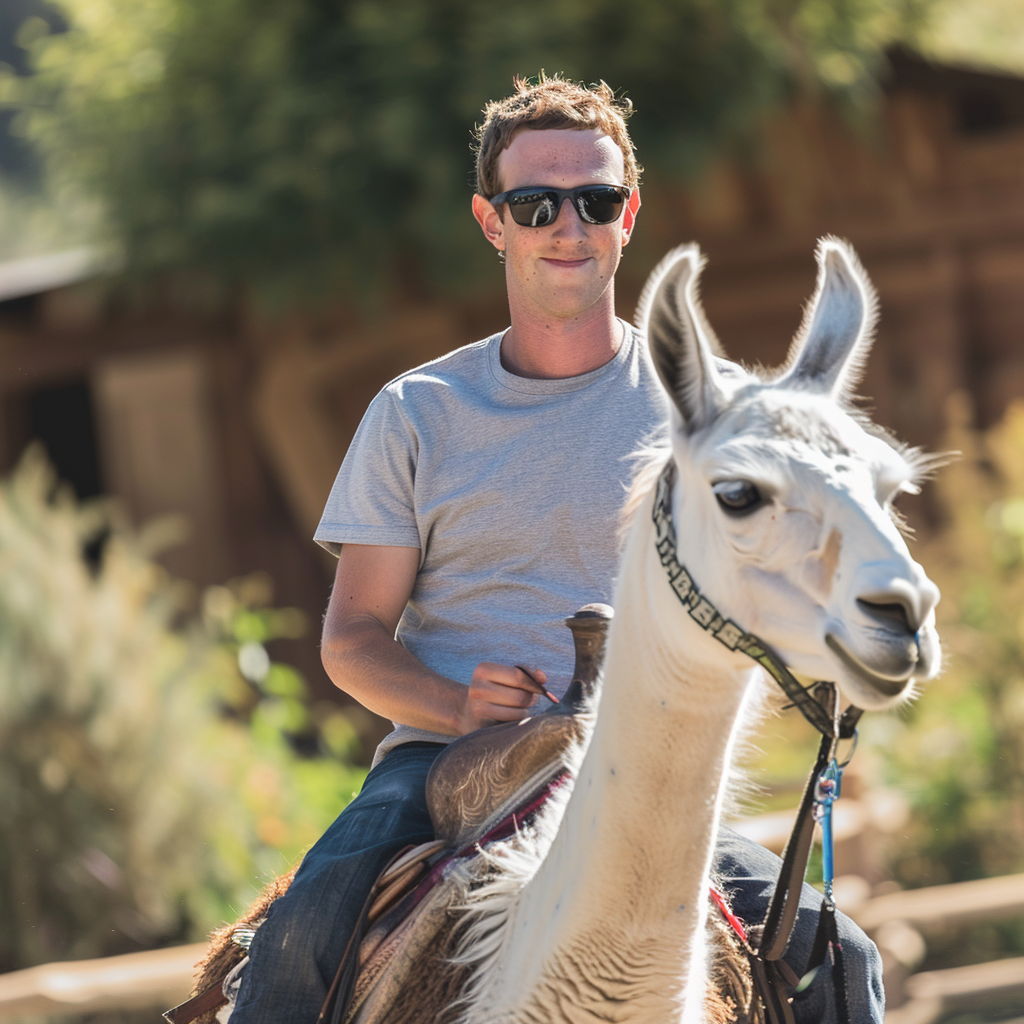Mark Zuckerberg's "Thoughts on Open Source AI"

A few weeks ago, I wrote up a conversation Mark Zuckerberg had with the YouTuber Kallaway. To me, it showed a Zuckerberg that was coming into his own with regard to "going direct" and taking his (and Meta's) message to the streets, as it were. At the same time, it was also still a bit too obviously self-serving. Well, he's getting better at it. Today, he's back with an even more straightforward push.
Ostensibly, everything Zuckerberg is talking about today is to back up the release of Llama 3.1, the latest versions of Meta's open source AI models. He's doing interviews again, which are interesting. But he's also taken a page out of the Steve Jobs playbook and has written up some high level thoughts for the world to read. This isn't called "Thoughts on Open Source AI" but it may as well be. Instead we get "Open Source AI Is the Path Forward".
He starts off talking about how Linux rose out of Unix and makes a case that a similar path is unfolding right now within AI. Then he takes a page out of another Steve's playbook – Ballmer – to make a case for developers, developers, developers, developers – but building, again, on top of the Llama open source models, not exactly a Microsoftian bargain. But all this leads to the main event:
Meta’s business model is about building the best experiences and services for people. To do this, we must ensure that we always have access to the best technology, and that we’re not locking into a competitor’s closed ecosystem where they can restrict what we build.
One of my formative experiences has been building our services constrained by what Apple will let us build on their platforms. Between the way they tax developers, the arbitrary rules they apply, and all the product innovations they block from shipping, it’s clear that Meta and many other companies would be freed up to build much better services for people if we could build the best versions of our products and competitors were not able to constrain what we could build. On a philosophical level, this is a major reason why I believe so strongly in building open ecosystems in AI and AR/VR for the next generation of computing.
He just came out and said it. I went ahead and highlighted it for you, just in case Zuckerberg wasn't clear enough. But he was. He could have hid behind mentioning nebulous unnamed competitors. Or even pulled the punch a bit by grouping a bunch of them together. Nope. One nemesis. "Constrained by what Apple will let us build on their platforms." Everyone knows he feels this way. He may or may not have poured tens of billions of dollars and changed the literal name of his company just so he could create a platform that wouldn't be beholden to the iPhone. But it's still wild and rare to state such a thing so directly, in writing, no less.
I would say this also seems to be a note to the EU and other regulatory bodies to keep pushing Apple on "the way they tax developers, the arbitrary rules they apply, and all the product innovations they block from shipping" – except that the EU seems to hate Meta at least as much, if not more than they do Apple. So I'm not sure how serious they'll take such a message in Brussels.
And depending on the outcome of the next election in America, it seems unlikely that Donald Trump is going to feel badly for Meta, which is run by someone in Zuckerberg whom he clearly intends to target for god knows what, versus Apple, which is run by his beloved Tim Apple. The cynical take would be that Zuckerberg's recent "badass" comment was meant to start mending that Trump bridge, but I'm not sure how cynical that is versus just pretty clear cut (and from the same interview with Emily Chang that was released in full today around the AI push).
Anyway, back to Zuckerberg's actual AI points:
Second, I expect AI development will continue to be very competitive, which means that open sourcing any given model isn’t giving away a massive advantage over the next best models at that point in time. The path for Llama to become the industry standard is by being consistently competitive, efficient, and open generation after generation.
This is a good point for open sourcing right now in this particular arms race. Though it will slow down eventually...
Finally, Meta has a long history of open source projects and successes. We’ve saved billions of dollars by releasing our server, network, and data center designs with Open Compute Project and having supply chains standardize on our designs. We benefited from the ecosystem’s innovations by open sourcing leading tools like PyTorch, React, and many more tools. This approach has consistently worked for us when we stick with it over the long term.
This is a much better point for why Meta should do this with AI. Their previous efforts in open sourcing have helped the company by making their technology the open standard that others can contribute to building out – including the cost, ultimately driving down costs for everyone, including Meta, as the largest beneficiary/user of said services.
But one thing Zuckerberg humorously never mentions beyond the comically vague "building the best experiences and services for people" is what Meta's actual model is – or what it will be with AI. If OpenAI is not really a non-profit, then Meta is really not really a non-profit. Zuckerberg should explain how they're going to make money off of this – but the reality there would seem to be that he doesn't exactly know yet. He said as much recently which spooked investors.
Two other call-outs worth calling out:
Our safety process includes rigorous testing and red-teaming to assess whether our models are capable of meaningful harm, with the goal of mitigating risks before release. Since the models are open, anyone is capable of testing for themselves as well. We must keep in mind that these models are trained by information that’s already on the internet, so the starting point when considering harm should be whether a model can facilitate more harm than information that can quickly be retrieved from Google or other search results.
This is pretty directly stating that AI really shouldn't be viewed differently from a safety perspective than Google search. It's all the same information, is his argument, just synthesized and served up differently.
The next question is how the US and democratic nations should handle the threat of states with massive resources like China. The United States’ advantage is decentralized and open innovation. Some people argue that we must close our models to prevent China from gaining access to them, but my view is that this will not work and will only disadvantage the US and its allies. Our adversaries are great at espionage, stealing models that fit on a thumb drive is relatively easy, and most tech companies are far from operating in a way that would make this more difficult. It seems most likely that a world of only closed models results in a small number of big companies plus our geopolitical adversaries having access to leading models, while startups, universities, and small businesses miss out on opportunities. Plus, constraining American innovation to closed development increases the chance that we don’t lead at all. Instead, I think our best strategy is to build a robust open ecosystem and have our leading companies work closely with our government and allies to ensure they can best take advantage of the latest advances and achieve a sustainable first-mover advantage over the long term.
Zuckerberg is certainly not mincing words about China here. Again, he could have easily obfuscated this part or just talked about "state actors", but he very specifically goes after China. Fascinating and not an accident, of course. He's also warning US regulators not to let the "closed" guys win here by "constraining American innovation" – this actually may be a call not to regulate any of this, at least not yet in these early days of AI, as it will just entrench the large players.
Overall, it's a full-throated and compelling case that Zuckerberg makes for open source AI being the way forward. Of course it wouldn't matter if the performance would Llama couldn't back it up. But it looks like it can, at least from the benchmarks that Meta is releasing. I'm sure we'll be hearing a lot more about this in the coming days and weeks. I'm also sure there is no way in hell that Meta is ever going to be a part of Apple Intelligence now.
One more thing: one competitor explicitly never mentioned in his post? OpenAI. Though they are obviously addressed in the benchmarks through GPT-4 (and GPT-4o). And they are also addressed in the aforementioned sit down with Emily Chang, which is probably worth its own post tomorrow (see: update below)...



Not made with Meta AI, as it's not yet available in the UK...
Update July 24, 2024: As promised, some additional thoughts on Mark Zuckerberg's interview with Emily Chang...





